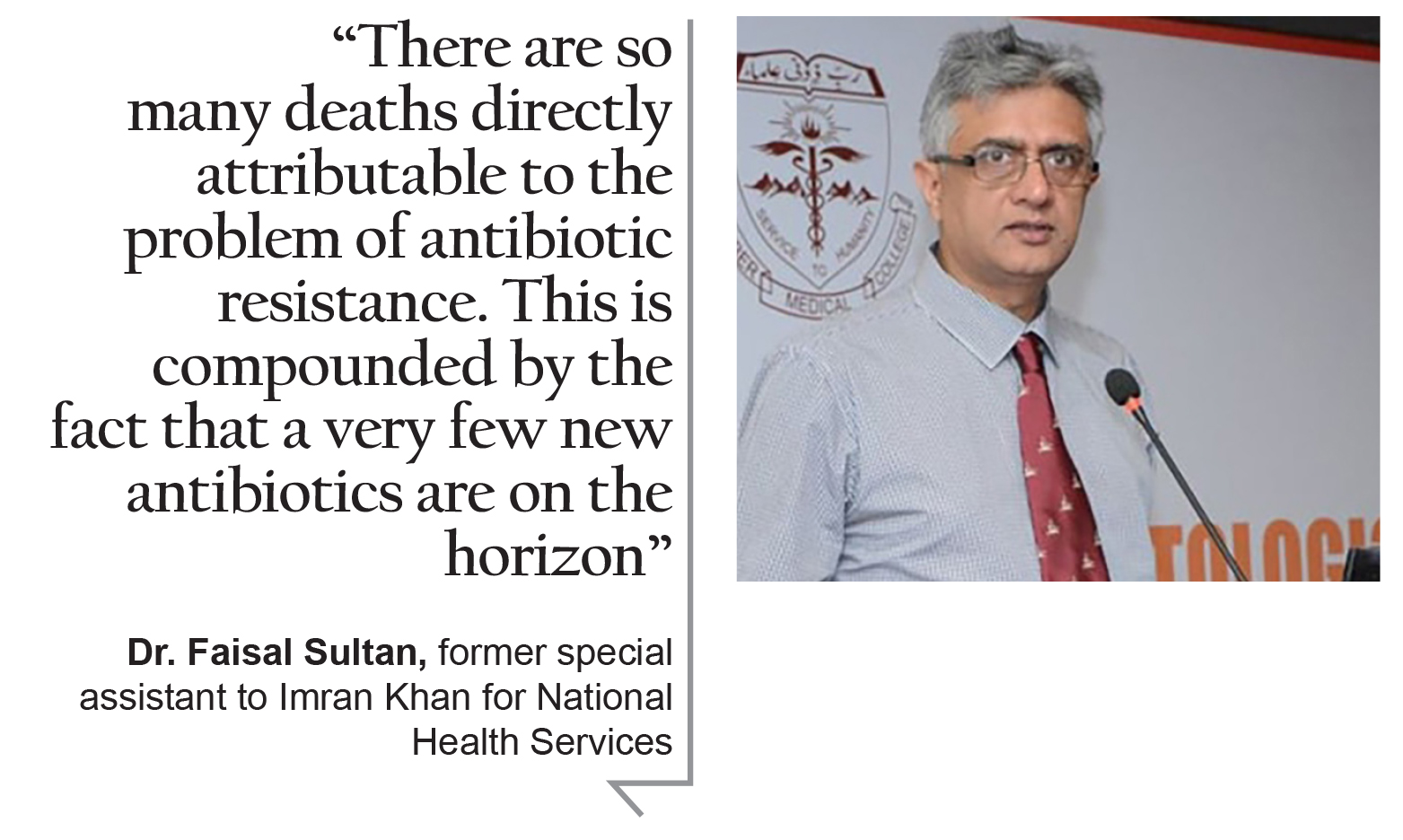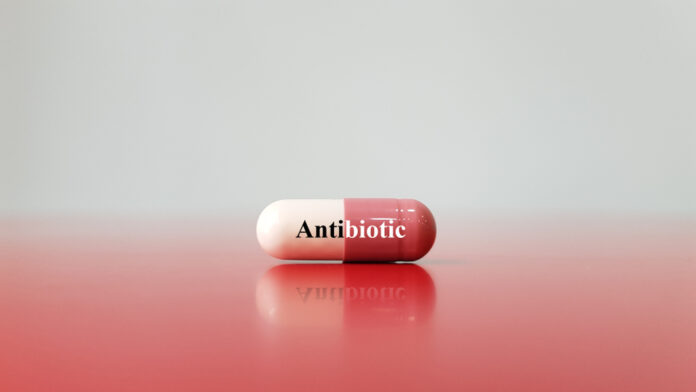In Pakistan it is a common practice to self-diagnose and self-prescribe medicines, including antibiotics, for minor health problems like cold and flu. It’s quick and convenient. But it’s not inconsequential.
The overconsumption and misuse of antibiotics is leading to antibiotic resistance in humans and animals, posing a threat of food security, public health and development. Diseases related to bacterial infections such as tuberculosis, pneumonia and gonorrhoea are becoming harder to treat, as the antibiotics required to treat them have become less effective. Antibiotic resistance therefore leads to prolonged hospital stays, exorbitant medical costs and high mortality rate.
This, in turn, leads to a population that is unhealthy and cannot be helped with conventional medicines. The resultant effects on productivity and public health management could possibly be dire. So what is Pakistan doing to counter this fast creeping problem?
Antibiotics and antibiotic resistance
Very simply antibiotics are “medicines used to prevent and treat bacterial infections and antibiotic resistance occurs when bacteria change in response to the use of these medicines,” as defined by the World Health Organisation (WHO).
To understand the concept further, Profit reached out to Dr. Faisal Sultan, the former special assistant to Imran Khan for National Health Services. He said “a basic understanding of biology tells us that each time an organism such as a bacterium multiplies, it has the possibility of creating a mutation that may offer resistance against a chemical, such as an antibiotic in this case.”

Therefore, the development of antibiotic resistance is inevitable to a certain extent. “As there are virtually an uncountable number of bacteria, each time they divide and reproduce, they may end up having mutations that can provide possible resistance against antibiotics and enable them to survive. In fact, studies indicate that even bacteria that have never been exposed to human interaction or modern antibiotics can still contain resistance genes against modern antibiotics,” Dr. Sultan explained.
That being said, the reckless consumption of antibiotics has also massively aggravated the issue. Dr. Faisal Sultan adds, “the inappropriate and massive usage of antibiotics by humans and to a greater degree, animals has enormously contributed to the spread of antibiotic resistance.”
The bacteria, not humans or animals, becomes antibiotic resistant. This bacteria may infect humans and animals, and the resulting infections are difficult to treat compared to those caused by non-resistant bacteria. Consequently, patients face higher medical costs, excruciating hospital stays and risk of increased mortality.
Scope of the problem
This is not just a Pakistani problem. Antibiotic resistance is dangerously rising across the world. According to the WHO, “new resistance mechanisms are emerging and spreading globally, threatening our ability to treat common infectious diseases. A growing list of infections- such as pneumonia, tuberculosis, blood poisoning, gonorrhoea, and foodborne diseases- are becoming harder, and sometimes impossible, to treat as antibiotics become less effective.”
This problem is further pronounced in the developing world due to medical malpractice, such as the ubiquitous availability of antibiotics. According to Dr. Sultan, “in developing countries, the dispensing of antibiotics over the counter has created even more unnecessary usage and exposure. Many poultry and animal industries use antibiotics and this then ends up in the food supply of humans, posing detrimental consequences for human health.”
Despite clear warning on the medicine’s packaging, antibiotics are readily sold over the counter without a doctor’s prescription. Additionally, without standard treatment guidelines, antibiotics are often overprescribed by veterinarians and health workers, leading to public overusage. Such consumer practices aggravate the emergence and spread of antibiotic resistant bacteria.
Dr. Nauman Ul Haq, a health economist, indicates various causes of the emergence and spread of antibiotic resistance. “Inappropriate prescription practices, inadequate patient education, limited diagnostic facilities, unauthorised sale of antimicrobials, a lack of appropriate functioning drug regulatory mechanisms, and non-human use of antimicrobials, such as in animal production, are some of the causes of high antibiotic resistance is developing countries.”
What are the dangers of antibiotic resistance?
According to Dr. Faisal Sultan, “the most imminent threat of antibiotic resistance is the inability to combat diseases that are presently treatable. Modern medicine is contingent upon the efficacy and effectiveness of modern antibiotics. Several fields such as advanced surgery, neonatology, ICU care, cancer treatment and transplants are impossible to function without effective antibiotics. Estimates such that over a million people die directly due to infections caused by resistant organisms, and up to 5 million deaths result from indirect reasons.”

This inadvertently poses a global health crisis. “There are so many deaths directly attributable to the problem of antibiotic resistance. This is compounded by the fact that a very few new antibiotics are on the horizon.”
Though it’s a global problem, its effects are more acutely felt in the developing world. “Not only do we have greater resistance in certain kinds of bacteria, the access to modern antibiotics (especially the newest ones) is limited and they cost extremely high. This will have disastrous consequences. Many infections will become untreatable and people will die of previously treatable infections, as antibiotics from the past become increasingly ineffective,” Dr. Faisal Sultan details.
“Without urgent action, we are heading for a post-antibiotic era, in which common infections and minor injuries can once again kill,” warns the WHO.
Effects on the local economy and public health management
This will inevitably wreak havoc for the local economy and public health management. “The cost of delivering healthcare especially in certain specialities will rise excessively, making it highly difficult to perform procedures such as cancer treatment, transplants, modern surgery, and so on and so forth,” explains Dr Sultan.
Similarly, Dr. Haq believes that “Antimicrobial resistance undoubtedly costs the health system more in terms of the number of patients to be treated per hour along with extended hospital stays. As resistant infections are more expensive to treat, the cost of health services are likely to be directly affected by antimicrobial resistance. Increased health expenditures may be felt in the cost of medicines, as more expensive antimicrobials are required, as well as more days spent in the hospital, more consultation time with providers, and increased demand for laboratory services.”
The World Bank models project a low burden of antimicrobial resistance could increase the global health costs by $330 billion; a high burden could increase health costs by $1.2 trillion.
Studies indicate that in the European Union alone, the additional burden of antibiotic resistance involves 25,000 deaths, 2.5 million hospital days and economic losses worth 1.5 billion euros, owing to the extra healthcare costs combined with decreased productivity.
Dr. Haq adds, “the growing demand for health-care services in developing countries puts additional strain on both public and private health-care spending, which, when combined with declining trade and livestock production, may result in a public deficit. Major chunk of health financing in low and middle income countries comes from out of pocket (OOP) payments which are associated with catastrophic and impoverishing household spending.”
The impacts are particularly concerning in developing countries, where such economic costs can’t be sustained. A World Bank report suggests that in the context of high antibiotic resistance, an additional 24 million people will be plunged into dire poverty by 2030. Low-income countries will mostly face the brunt of this.
What can be done?
The WHO reports, “the world urgently needs to change the way it prescribes and uses antibiotics. Even if new medicines are developed, without behaviour change, antibiotic resistance will remain a major threat.” What is that behaviour change? Behaviour change means taking actions that reduce the spread of infections. This involves vaccination, handwashing and good food hygiene.
Apart from infection prevention and control, it’s also important to target the root cause of the problem, which is the overconsumption of antibiotics. There are measures that individuals, policy makers, healthcare professionals, healthcare industry and the agriculture sector can take to minimise antibiotic usage. “Both global and national efforts are required towards ensuring that the use of antimicrobials is appropriate and that there is what is called antimicrobial stewardship not only within hospitals and institutions but within the entire community,” says Dr Sultan.
“There is also the need to ensure that animal and veterinary use is properly regulated and the public understands the risks of the inappropriate use of using antibiotics for conditions that do not benefit from the use of antibiotics. This is a complicated topic and requires an in-depth approach which cuts across many sectors beyond just health. Pakistan has had a very comprehensive national action plan but as always it is the execution of the parts of the plan that is much more important than what is written on paper.”


























As a result, many people get ill and cannot be treated with standard medical care. The repercussions for public health and productivity management are uncertain. What measures is Pakistan doing to stop this emerging crisis?
Nice knowledge gaining article. This post is really the best on this valuable topic.
온라인 카지노
j9korea.com